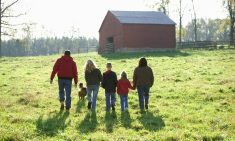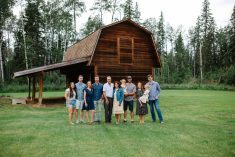For centuries, it worked for royalty. If you happen to be the first-born son, you were on the path to the throne, no questions asked. And it happened on the farm too. The eldest son was automatically in line to take the reins when Dad got old enough that he needed to step aside.
Increasingly, that kind of hierarchical approach is getting called outmoded, unfair and even dangerous for the future of the farm.
But it’s still in place, and the first-born child gets groomed to inherit the family farm, regardless of whether they’re the best person for the job.
Read Also

‘No agenda, no attenda’: How to professionalize your family farm meetings
Establishing meeting ground rules can help a farm family find ways to communicate that work for the business and the family.
In fact, sometimes the farm might be a lot better off if they were encouraged to go elsewhere to build a career. And everybody else in the family knows it.
There may also be a temptation to try and accommodate as many family members as possible, simply because parents are reluctant to say “no” and risk bad relations.
“I have seen situations where people say, ‘My kids want to farm, so I’ve got to make room for them.’ But if they don’t want to farm together and one is dragging the other along, you are just pushing that problem out 10 years, and there’s eventually going to be a blow-up,” says Len Davies, founder of Davies Legacy Planning Group, who has guided many farm families through the succession process. “When you look at succession planning, you’ve got three circles — the family, the business, and the ownership. If your kids aren’t capable of running the farm and you’re saying, they’re going to be successors because they want to be, then all you’re going to do is mess up the management circle, which then will mess up the family circle, and mess up the ownership part.”
Nor is Davies alone. More farm advisers across the country report the same. “Just because you have a son or daughter who has grown up on the farm doesn’t mean that he or she is the best suited to run it,” says family farm coach and succession planner Elaine Froese. “You need to separate the fact that they are your children and say, from a business perspective, are they the ones that have the skill set that your farm team needs?”
Almost as bad is where an unwilling child inherits by default, perhaps as part of the sudden death of the parent who was running the farm operation, says Froese. It even has a name, legacy pressure, defined as the expectation felt by some young people who feel that they will continue the family farm when that’s not really their passion.
From entitlement to gratitude
Froese says she’d like to see entitlement to the family farm replaced by gratitude. “Among the top stumbling blocks to a successful farm business transition is lack of appreciation, unwillingness to give up power and control, and lack of forgiveness,” she says. “From a conflict resolution standpoint, a collaborative model of resolving conflict and making collaborative decisions is a win-win for everybody, and is much more effective than a hierarchy.”
Froese emphasizes the importance of clear communication and what she calls the Three Cs — clarity of expectations, certainties of timelines and commitment to act.
“Clarity of expectations means the family has to sit down and be clear about what their vision is for the farm business, and for the family, and how each person wants to show up in both of those systems, and then speak to each other about what your ideal life looks like and why,” says Froese.
Certainty about timelines and agreements is also a must. “I know young men who are passionate about having a successful farm business but they’re not getting good leadership from the founder,” she says. “They want them to complete things. They want to know what their vision is and the timeline. They want to be compensated partially now, because they’re 35 with two young kids. They can’t wait another 10 years and they don’t want everything to be resolved when there’s a death. Wills are great for the dying but they’re not great for the living. They’re not appropriate as a farm business plan because the succession plan is for now; it’s for the living.”
Commitment to act means actually having to start giving things up to meet the current needs of the successor, not just future needs. “The successor needs certainty now and equity now so he or she can leverage for their future earnings. If the parents keep all their equity, they can’t get any advantage from growth,” says Froese. “There’s typically a huge fear of failure in the next generation and so that’s why the reins are tight for as long as possible, which I think is crazy. When you have a younger farmer who’s been there for 10 years and has done amazing things, why would it be any different if you changed or transitioned some ownership to them?”
Froese believes many farm men aren’t paying attention to their own self-care and emotional well-being, and if they are trying to live their lives vicariously through the successor, that’s a mistake. “Live the life you were intended to live at the chapter of life that you’re at,” she says. “Respect your age and respect that your roles are going to shift. Be happy at the stage that you’re at, and be a leader to your team because I would like to see founders become wise elders. There’s always going to be a role for them.”
Equal versus fair
Davies says he finds it odd that farmers have wrapped their heads around the difference between fair versus equal when it comes to the value of the farm, but they’re having a much harder time applying that same concept to skills. “If the farm’s worth $2 million and they’ve got four kids they can’t divide that and give each kid $500,000; they’ve bought into that concept,” he says.
“They’re prepared to tell somebody, ‘I’m sorry you’re not getting a quarter of this farm and this is the reason why.’ But they’re not prepared to say, ‘No, you can’t come in because you just don’t have a role here.’ They want to bring the brother in and that’s okay if the place can support two families, and it’s okay if they realize each other’s strengths and are willing to work with it. If they don’t realize that, it’s a recipe for disaster.”
Parents also have to be prepared for another child to turn up out of the blue looking for their share of the business. “Parents need to think about reallocating some of their resources to a personal business wealth bubble outside of the farm so they can allocate wealth to non-farming or non-business heirs from a different place and leave the farm alone,” says Froese.
Understanding what makes everyone tick
Davies and Froese both use many different tools to help farm families identify the strengths, weaknesses and differences in character of everyone involved in the farm succession, and where they best fit into the farm team.
“First of all you look at what the vision is for the farm. If all parties are in growth mode, are they willing to make collaborative decisions?” asks Froese, who uses a tool she calls the ultimate decision-maker, which identifies who is making what kinds of decisions on the farm. “It’s very telling because the best managers are compassionate mentors and they train and lead to be replaced in the future. Most farm men don’t ever want to retire but their role is going to shift, and then it becomes the dance of letting go and figuring out which pieces they still want to have a role in, and when the ultimate decision-making goes from the founder to the successor. It’s more valuable when both have a collaborative decision-making role and they make decisions together based on their unique skill sets and perspectives.”
Davies uses a method known as the Kolbe Index to help families better understand what makes each other tick.
The Kolbe Index is a computer-based system that assesses each person based on responses to a number of questions across four Action Modes — instincts that humans use to creatively problem-solve — and rates the person according to his or her unique operating style. “It tells you how each person will look at a task or an idea, so one person might be the Fact Finder, who likes to do research, while another is the Follow Through, the person who runs the office perhaps and gets things done. You might have the Quick Start, who is the idea guy, and the Implementer who figures out how to make things work, and suddenly you have a nice team. I tried this with my kids and our family business and it’s a powerful tool. Now I look at my kids as assets. The problem with a lot of parents is if their kids aren’t just like them, and most of the time they’re not, they look at them as a liability rather than an asset which can work for you.”
Birth order does play a role
Although it shouldn’t be the deciding factor in who is the best farm leader, birth order does have an influence, says Froese. “There are psychological differences or different needs or ways of showing up in the world based on birth order,” she says. “For example, people might say, ‘I can tell you’re the oldest child because you’re so responsible and a take-charge kind of person.’ That is typical, and does come with birth order. I do a map on every family I work with called a genogram. It’s important for me to know how old people are and line them up in descending order because that gives me some clues as to why they might be feeling they’re not getting their independence or ownership and control, based on their ages.”
Birth rite has no place on the family farm, Froese says, but there can be a place for engaged family members, and sometimes even outsiders, who are doing purposeful, meaningful work that’s aligned to their values and the way they are wired.
Resources to help you choose the right successor:
- Susan Forward — Emotional Blackmail: When the people in your life use fear, obligation, and guilt to manipulate you. Harper Collins, 1997.
- Dr. Kevin Leman – The Birth Order Book: Why you are the way you are. Revell, 2009.
- Elaine Froese — Farming’s In-Law Factor… how to have more harmony and less conflict on family farms.
- Stephen Poulter — The Father Factor: How your father’s legacy impacts your career, Prometheus Books. 2006.
- Jeanne Safer — Cain’s Legacy: Liberating siblings from a lifetime of rage, shame, secrecy, and regret. Basic Books, 2012.
- The Kolbe Index
















